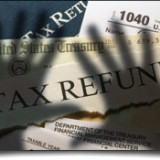The use of prepaid debit cards for tax refunds hurts the poorest citizens
by Curtis Arnold
It’s a cliché, but it bears remembering: if something sounds too good to be true, it probably is. And to be sure, the prepaid debit card industry has a long and ongoing legacy of hyperbole, with card issuers saying plenty about the ease and convenience of their plastic products and precious little about often-predatory fees.
Obviously, it’s no surprise whatsoever to see companies with wares to hawk ignore or downplay the perils of prepaid debit cards and instead tout their benefits. But increasingly it is presumably impartial and consumer-oriented governments that are extolling the wisdom of using prepaid debit cards to deliver tax refunds to the millions of Americans – 17 million adults, or 8 percent of all U.S. households, by the Federal Deposit Insurance Corporation’s (FDIC) latest tally – who lack bank accounts and can’t take advantage of direct deposit.
The arguments government officials in states like Oklahoma, Connecticut and Virginia make in favor of utilizing prepaid debit cards to deliver tax refunds to so-called unbanked citizens sound persuasive. For the citizens themselves, receiving a refund via a prepaid debit card instead of a paper check means they’ll get their money weeks faster than if they had to wait for snail mail. Speed is no small matter for many low-income Americans who use their refunds to pay off high-interest payday loans that they may be forced to take while waiting for a check from the U.S. Treasury.
The governments themselves also insist that prepaid debit cards are a boon to all taxpayers. The crux of the argument is that cash-strapped governments can garner big savings by delivering refunds electronically with prepaid cards instead of printing and mailing physical checks. At least one study reported that it cost nearly $1 more to mail a check than to deliver an electronic payment.
In this era of belt-tightening austerity, that sort of taxpayer-saving government efficiency is to be cheered, right? Not exactly. Persuasive new research by John Friedman, an assistant professor of public policy at the Harvard Kennedy School, dismantles the deceptively alluring argument that tax refunds delivered on prepaid debit cards are good for everyone. In an article at Bloomberg Law, Friedman concedes that state governments can trim their own costs by switching from paper checks to prepaid debit cards. But the problem is that many of the hefty fees associated with prepaid debit cards – such as an account set-up charge and fees for taking money out of an ATM – are pushed off on to the taxpayers receiving the refunds. In his research, Friedman cites data from the now discontinued federal tax refund program in which taxpayers received money on a MyAccountCard. Recipients of refunds on that particular prepaid debit card paid an average of $19 during the first six months of use, an amount far and above the $1 governments save.
What is particularly troubling about this rush towards offering – and sometimes actually mandating – those who don’t have bank accounts receive their refunds on prepaid debit cards is who is being impacted. Unbanked Americans are typically poor. Forcing the poorest among us to shoulder what amounts to a minimal government cost savings sounds too bad to be true. Unfortunately, it increasingly is.
